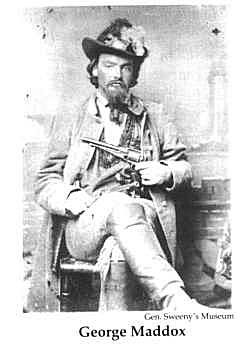THE GUERRILLA MAN
(traditional)
|
Cathy Barton—mountain dulcimer and vocal; Dave Para—guitar and vocal; Dave Wilson—fiddle
“The Gambling Man,” is a common American folk song derived from a light-hearted piece entitled “The Roving Journeyman,” probably of Irish origin, in which the narrator brags of his appeal to the ladies and tells of a dispute between his chosen girl and her mother, elements which strongly persist in almost every version of this song. The occupation of the narrator, however, has undergone many changes through the years and across the miles. He may still be a gambler or a journeyman, but he may also appear as a shanty-boy, a railroad man, a Union soldier, or, as is the case here, a guerrilla during the Civil War. Versions of this song can be found in Vance Randolph's Ozark Folksongs and in H.M. Belden's Ballads and Songs Collected by the Missouri Folk-lore Society. Our rendition is a compilation of two Ozark variants collected in Holt County, Missouri, and in Mena, Arkansas, in the early 1900's. The latter version was sung by the well-known Ozark traditional singer, Emma Dusenbury, who said the song was known in the Ozarks as long ago as 1875.
Our version of this song has the enigmatic concluding line, “And every pocketbook I spy/With joy I slide her down.” Michael Fellman in his classic study of Missouri-Kansas guerrilla warfare, Inside War, says this line refers to both “material as well as sexual pleasure.” The story in this traditional Ozark song is reminiscent of the relationship between Kate King and William Clarke Quantrill (see notes for “Kate's Song”), since Kate also left her family at a young age to “roam the country over and be a guerrilla bride.”
As I roved out one morning
She took me to her parlor
Oh, daughter, oh dear daughter
Mother, Oh dear mother,
|
 The romanticized picture of the guerrilla in this song is shown by the
photograph of George Maddox, Quantrill's Chief Scout, to be an image
some of the guerrillas obviously had of themselves. We would like to
especially thank Dr. Thomas Sweeney and Gen. Sweeny's Civil War Museum,
Republic, Mo. (across from the Wilson Creek Battlefield) for use of this
striking photo. The traditional "Gambling Man" verse about the ruffled
shirt is especially appropriate for the border guerrilla (as the
photograph also reveals) since many of them wore a dis- tinctive
loose-fitting shirt with fancy embroidery sewn by their wives,
sweethearts or mothers.
The romanticized picture of the guerrilla in this song is shown by the
photograph of George Maddox, Quantrill's Chief Scout, to be an image
some of the guerrillas obviously had of themselves. We would like to
especially thank Dr. Thomas Sweeney and Gen. Sweeny's Civil War Museum,
Republic, Mo. (across from the Wilson Creek Battlefield) for use of this
striking photo. The traditional "Gambling Man" verse about the ruffled
shirt is especially appropriate for the border guerrilla (as the
photograph also reveals) since many of them wore a dis- tinctive
loose-fitting shirt with fancy embroidery sewn by their wives,
sweethearts or mothers.